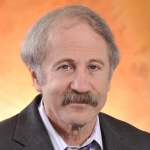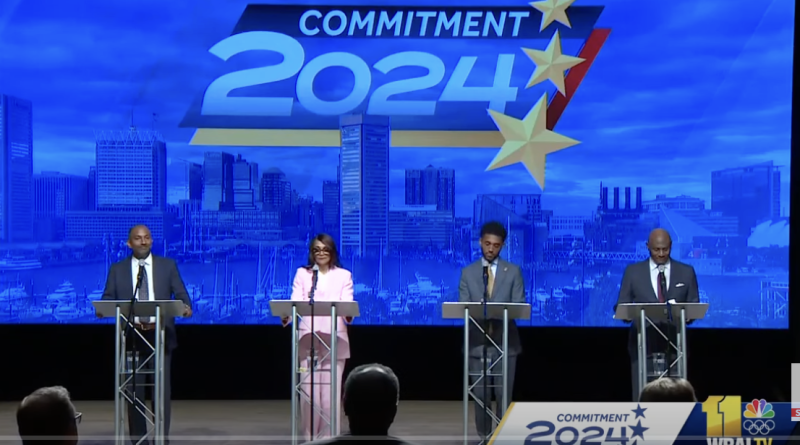Disappointing Baltimore City Mayoral Debate
At Morgan State University, there was a largely disappointing mayoral debate Wednesday evening on WBAL Television moderated by the knowledgeable WBAL Radio hosts Jayne Miller, C-4, and Maryland Public Television’s Jeff Salkin.
The candidates comprised Mayor Brandon Scott, former Mayor Sheila Dixon, former prosecutor Thiru Vignorajah, and businessman Bob Wallace, all former candidates as well.
It was really quite an unusual political debate. None of the questioners tried to stand out; none of them tried to confront the candidates with tough follow-up questions; none of the participants interrupted one another; and outside of Mayor Scott’s accusing ex-Mayor Sheila Dixon of lying and stealing in her first term, no one else got notably ugly. Maybe this anodyne quality was due to all of the candidates’ being Democratic.
Repeatedly Scott gave a glowing account of his administration, its purported lessening of murders and non-fatal shootings, juvenile crime, and unemployment.
Dixon was just a little more easygoing than one expected but called Baltimore a dirty city, blaming Scott for low police morale and claiming that she had brought crime down to its lowest point during her administration and accusatorily wondering why “crime and schools are out of control” under Scott. She wondered why Scott doesn’t deal with juvenile crime more.
There were continuing claims and counter-claims about the effectiveness and status of The Mayor’s Office of Neighborhood Safety, American Rescue Plan Act dollars targeted at improving public safety, and the sufficient or insufficient issuing of citations, a point of continuing conflict between Scott and States Attorney Ivan Bates.
Wallace claimed that all of the expensive projects in Baltimore City were for show, and none benefitted the city.
Vignorajah accused Scott of overseeing the worst property taxes and educational system in the state. Moreover, he accused Scott of giving contracts to his political donors. Scott had succeeded, he claimed, only wherein all cities had succeeded.
Scott said we need to invest more in education. On critic’s note here: if Baltimore spent $100,000/student, Democratic politicians would wonder why we cannot spend what is necessary.
Wallace attacked Scott’s leadership mostly in generalities, but his contributions were the most animated, if not the most articulate.
Salkin asked if Scott would commit to adding police…Scott said the city was adding police, but there was no pressuring Scott to explain his early support of defunding the police.
Jason Newton, WBAL’s incredibly placid host, allowed a violation of unstated debate rules by not allowing Scott a follow-up to a devastating challenge by Vignarajah in his closing statement, which was the last of the evening: “If things are getting better,” he challenged Scott, why over the last 25 years have we lost 25% of our population?
Devastating, but Scott had the right to answer the question.
The most disappointing oversight in the debate was the lack of even a mention of the importance of intact 2-parent families. Baltimore families run by single-parent mothers comprise over 80% of Baltimorean homes. There is a wealth of academics and political critics who claim that the major problems of violent juvenile crime, substandard education, poverty and bullying, and awful qualities of life that inhabit Baltimore, are caused by the lack of two-parent families.
Three years ago, Melissa Kearney, an economics professor at the University of Maryland, stated, covering most of these significant problems: “Research consistently shows that kids who live with two married parents have lower rates of poverty, have higher cognitive test scores in childhood, have fewer behavioral problems. They seem to have better health outcomes. They’re less likely to live in poverty when they [reach 25]. They’re more likely to complete college and they’re less likely to become young, unmarried parents themselves.” Many other experts have written similarly.
No, this was not addressed; neither was even one question as to how to change the horrible state of marriage and fatherlessness in the city of Baltimore.
Maybe one more half-hour could have helped this debate – it wasn’t terrible, just inadequate, and there was not enough time to adjudicate factual disputes. Follow-up questions can be used to do so, but none of the questioners pushed on incomplete answers.

Richard E. Vatz is professor emeritus of political rhetoric at Towson University and author of The Only Authentic of Persuasion: the Agenda-Spin Model (Authors Press, 2022) and many other works, essays and op-eds. He is a Distinguished Professor at Towson University and has won a number of teaching awards.

